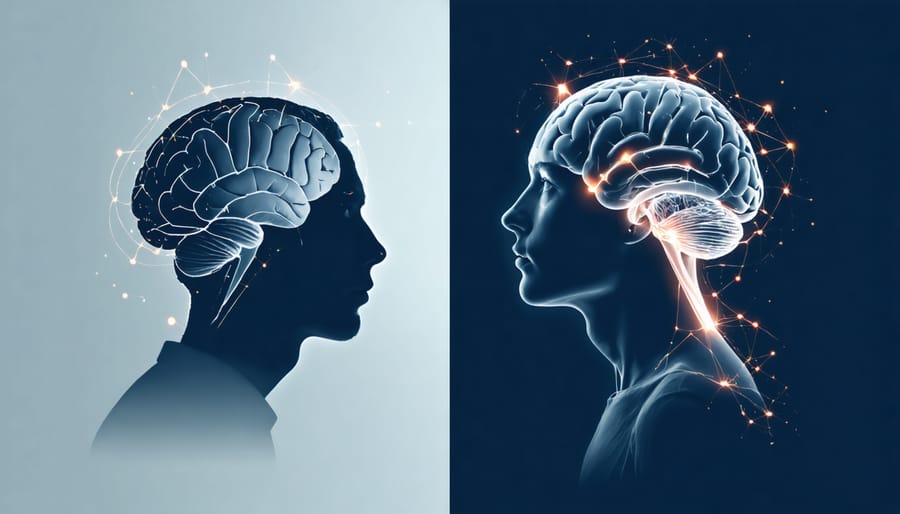The intricate relationship between neuroscience and faith represents one of the most fascinating intersections of modern science and Christian spirituality. As we delve deeper into understanding the human brain, we discover remarkable parallels between biblical wisdom and scientific discoveries about mental health and emotional well-being.
“For God has not given us a spirit of fear, but of power and of love and of a sound mind” (2 Timothy 1:7) speaks directly to this harmony between faith and mental wellness. Recent neuroscientific research reveals how practices like prayer, meditation on Scripture, and community worship actually create measurable changes in brain structure and function, supporting what believers have known through faith for millennia.
This convergence offers hope and healing for Christians seeking mental health support. Just as we wouldn’t hesitate to treat a broken bone or manage diabetes, understanding our brain’s God-given mechanisms for healing and growth allows us to embrace both spiritual and clinical approaches to mental wellness. Through this lens, we see that seeking professional mental health care can complement, rather than compete with, our faith journey.
As we explore this vital connection between neuroscience and faith, we’ll discover how God’s design of our brains affirms biblical truths while providing practical pathways for emotional and spiritual growth. This understanding empowers believers to confidently pursue both spiritual and clinical resources for mental health, knowing that all truth ultimately points to our Creator.
The Biblical Foundation for Mental Health Care
Scripture’s View on Mental and Emotional Health
Scripture offers rich insights into biblical perspectives on mental health, showing God’s deep concern for our emotional well-being. The Bible acknowledges human struggles with anxiety, depression, and emotional distress through various accounts. Consider how David openly expressed his emotional turmoil in the Psalms, crying out to God in both joy and despair. In Philippians 4:6-7, we find reassurance: “Do not be anxious about anything, but in every situation, by prayer and petition, present your requests to God.”
The story of Elijah demonstrates how God tenderly cares for those experiencing mental exhaustion. After his victory on Mount Carmel, Elijah fell into depression, yet God responded with compassion, providing rest, nourishment, and gentle guidance (1 Kings 19:1-18). Similarly, Jesus’s words in Matthew 11:28, “Come to me, all you who are weary and burdened, and will give you rest,” remind us that seeking help and finding rest are integral parts of our faith journey.
The Christian Tradition of Healing Ministry
Throughout history, Christians have played a vital role in caring for those struggling with mental and emotional challenges. Jesus’s ministry exemplified compassion for those suffering in body, mind, and spirit, as demonstrated in His healing of the demon-possessed man in Mark 5:1-20. This tradition of healing ministry continued through the early church and medieval periods, where monasteries often served as places of refuge and care for those experiencing mental distress.
The Christian church has historically viewed healing as a holistic endeavor, addressing both spiritual and physical needs. Many of the first hospitals and care facilities were established by religious orders, reflecting Christ’s command to care for the sick and vulnerable. This commitment to wholeness is rooted in the biblical understanding that humans are created in God’s image, deserving dignity and compassionate care.
Today, this legacy continues as many Christian organizations integrate modern mental health practices with spiritual care, recognizing that God can work through both prayer and professional treatment. This approach honors both our spiritual heritage and our responsibility to utilize the medical understanding God has allowed us to develop.

Understanding God’s Design: The Neural Basis of Faith
The Neuroscience of Prayer and Meditation
Recent scientific research has revealed fascinating insights into how our brains respond during prayer and meditation, affirming what believers have known through experience about the transformative power of prayer. When Christians engage in deep prayer, neuroimaging studies show increased activity in areas of the brain associated with focus, emotional regulation, and peace.
During contemplative prayer, the frontal lobe, which handles attention and complex thinking, becomes more active. Meanwhile, the parietal lobe, which processes our sense of self and spatial orientation, shows decreased activity. This biological response aligns beautifully with Scripture’s teaching about losing ourselves in God’s presence: “Be still, and know that I am God” (Psalm 46:10).
Meditation on God’s Word produces similar effects, with regular practice leading to measurable changes in brain structure. These changes are associated with reduced anxiety, improved emotional well-being, and enhanced compassion – fruits of the Spirit that God promises to those who remain in Him (Galatians 5:22-23).
This scientific understanding doesn’t diminish the spiritual nature of prayer; rather, it reveals how God designed our bodies to benefit from communion with Him. Just as David wrote, “I am fearfully and wonderfully made” (Psalm 139:14), these discoveries highlight the intricate way God created us to connect with Him both spiritually and physically.
How Faith Shapes Our Neural Pathways
Recent neuroscientific research has revealed fascinating insights into how faith shapes our brains. When we engage in prayer, meditation on Scripture, or worship, our neural pathways undergo measurable changes that promote emotional well-being and spiritual growth. These findings align beautifully with what Scripture tells us about renewal of the mind (Romans 12:2).
Studies show that regular spiritual practices strengthen areas of the brain associated with emotional regulation, compassion, and focus. During prayer, researchers have observed increased activity in the prefrontal cortex – the area responsible for attention and complex decision-making. This scientific evidence supports what believers have long experienced: that time spent with God transforms not just our spirits, but our minds as well.
The concept of neuroplasticity – our brain’s ability to form new neural connections throughout life – demonstrates how consistent faith practices can literally reshape our thought patterns. When we “take every thought captive” (2 Corinthians 10:5) through Biblical meditation and prayer, we’re not just engaging in spiritual discipline; we’re actually creating new neural pathways that make it easier to maintain peace, joy, and Christ-centered thinking.
These findings remind us that God designed our brains to benefit from relationship with Him. As we cultivate our faith through regular spiritual practices, we’re working in harmony with both divine intention and scientific principle, experiencing transformation that reaches from our spirits to our neural networks.
Integrating Faith and Science in Mental Health Care
Prayer and Professional Counseling
In our journey of faith and healing, combining faith and therapy can create a powerful pathway to wholeness. Just as we seek both spiritual and medical care for physical ailments, our mental and emotional well-being can benefit from both prayer and professional counseling.
Scripture reminds us that God provides wisdom through various channels. Proverbs 15:22 tells us, “Plans fail for lack of counsel, but with many advisers they succeed.” Professional counselors can offer valuable insights and evidence-based techniques while our prayer life maintains our vital connection with God.
When seeking help, consider these practical approaches:
• Begin each counseling session with prayer, inviting God’s presence and guidance
• Share your faith journey with your counselor to ensure they understand your values
• Use scripture meditation alongside therapeutic techniques
• Maintain regular prayer and devotional practices while pursuing counseling
• Connect with faith-based support groups that complement professional therapy
Remember that seeking professional help doesn’t indicate a lack of faith. Rather, it demonstrates wisdom in utilizing all the resources God has made available for our healing. As James 1:5 encourages us, “If any of you lacks wisdom, you should ask God, who gives generously to all without finding fault.”
Through this integrated approach, we honor both the spiritual and scientific understanding of mental health that God has revealed to us.

Biblical Wisdom in Modern Treatment
The Bible offers timeless wisdom that aligns remarkably well with modern mental health practices. Scripture’s emphasis on community support, as seen in Ecclesiastes 4:9-10, “Two are better than one… if either of them falls down, one can help the other up,” mirrors the therapeutic value of group counseling and support systems. Similarly, the practice of mindfulness finds its biblical parallel in Philippians 4:8, which encourages focusing our thoughts on what is true, noble, and praiseworthy.
Modern treatment approaches often emphasize the importance of expressing emotions honestly, something the Psalms demonstrate beautifully through David’s raw prayers and laments. This biblical precedent validates the therapeutic practice of emotional processing and authenticity in counseling sessions. The scripture’s teaching on rest and renewal, as found in Matthew 11:28-30, aligns with current understanding of stress management and self-care.
Additionally, the Bible’s holistic view of human wellness – addressing body, mind, and spirit – corresponds with contemporary integrated treatment approaches. Proverbs 17:22, “A cheerful heart is good medicine,” reflects modern research on the connection between emotional well-being and physical health. Christians can confidently engage in evidence-based mental health treatments while remaining grounded in biblical truth, understanding that both scientific advances and scriptural wisdom come from the same Creator who desires our wholeness and healing.
Supporting Your Mental Health Journey with Faith
For Christians seeking mental health support, it’s essential to remember that caring for your mental well-being is a vital part of stewarding the life God has given you. Scripture reminds us that we are “fearfully and wonderfully made” (Psalm 139:14), encompassing both our physical and mental health.
Begin by seeking wisdom through prayer and Scripture meditation. The Bible offers numerous examples of individuals who experienced emotional struggles, from David’s psalms of lament to Elijah’s battle with depression. Their stories remind us that seeking help is not a sign of weak faith but of wisdom and courage.
Consider building a support network that includes both spiritual and mental health professionals. Many Christian counselors and therapists are specifically trained to integrate faith-based perspectives with evidence-based therapeutic approaches. Your church leadership can often provide recommendations for trusted mental health professionals who understand and respect your faith journey.
Practical steps might include:
– Joining a faith-based support group
– Maintaining a prayer and gratitude journal
– Regular exercise and self-care as acts of stewardship
– Building relationships with fellow believers who can provide encouragement
– Engaging in worship and community activities
Remember that seeking professional help doesn’t diminish your faith; rather, it can be seen as utilizing the resources God has provided through modern medicine and psychology. Just as you would seek medical care for a physical ailment, addressing mental health concerns is part of caring for your whole self as God’s creation.
Building a Faith-Informed Support System
Building a strong faith-based community support system is essential for nurturing both spiritual and mental well-being. As the Bible reminds us in Ecclesiastes 4:9-10, “Two are better than one… If either of them falls down, one can help the other up.”
Begin by identifying trusted individuals within your church community who understand the importance of both faith and mental health care. This might include pastors, Christian counselors, and fellow believers who demonstrate compassion and wisdom. Share your journey with these individuals, being open about both your spiritual and emotional needs.
Consider joining or starting a small group that specifically addresses mental health through a Christian lens. These groups can provide a safe space for sharing experiences, studying Scripture, and supporting one another through challenges. Remember that Jesus himself sought support from his disciples and took time to pray with trusted companions.
Engage with mental health professionals who respect your faith journey. Many Christian counselors and therapists are trained to integrate biblical principles with evidence-based therapeutic approaches. They can help you navigate challenges while honoring your spiritual beliefs and practices.
Make prayer and Scripture meditation a cornerstone of your support system. Philippians 4:6-7 encourages us to “present your requests to God” and promises His peace that “transcends all understanding.” Create a prayer circle of trusted friends who can intercede on your behalf and celebrate your progress.
Remember that seeking help is a sign of wisdom, not weakness. Just as the body of Christ has many parts working together (1 Corinthians 12:12-27), your support system should include various sources of strength and encouragement. This might mean participating in church activities, attending support groups, meeting with counselors, and maintaining regular fellowship with understanding friends and family members.
Be patient as you build this network, knowing that God provides the right people and resources in His perfect timing. Your journey of faith and mental wellness is unique, and having a strong support system will help you navigate it with grace and hope.

As we’ve explored throughout this article, neuroscience and faith aren’t opposing forces but rather complementary paths that illuminate our understanding of mental health and well-being. The God who created our intricate minds also provides wisdom through both Scripture and science to help us navigate life’s challenges. Just as King David wrote, “I praise you because I am fearfully and wonderfully made” (Psalm 139:14), modern neuroscience continues to reveal the amazing complexity of God’s design.
For Christians seeking mental health support, remember that utilizing professional care alongside your faith journey is not only acceptable but can be a demonstration of good stewardship of your God-given health. The integration of faith-based practices with evidence-based treatments offers a holistic approach to healing and growth.
Moving forward, consider speaking with your pastor or Christian counselor about incorporating both spiritual and therapeutic practices into your mental health journey. Remember that seeking help is a sign of strength, not weakness, and that God’s love encompasses all aspects of our well-being – mind, body, and spirit.
Together, faith and neuroscience provide a fuller picture of God’s provision for our mental health, offering hope and practical solutions for those seeking healing and wholeness.
